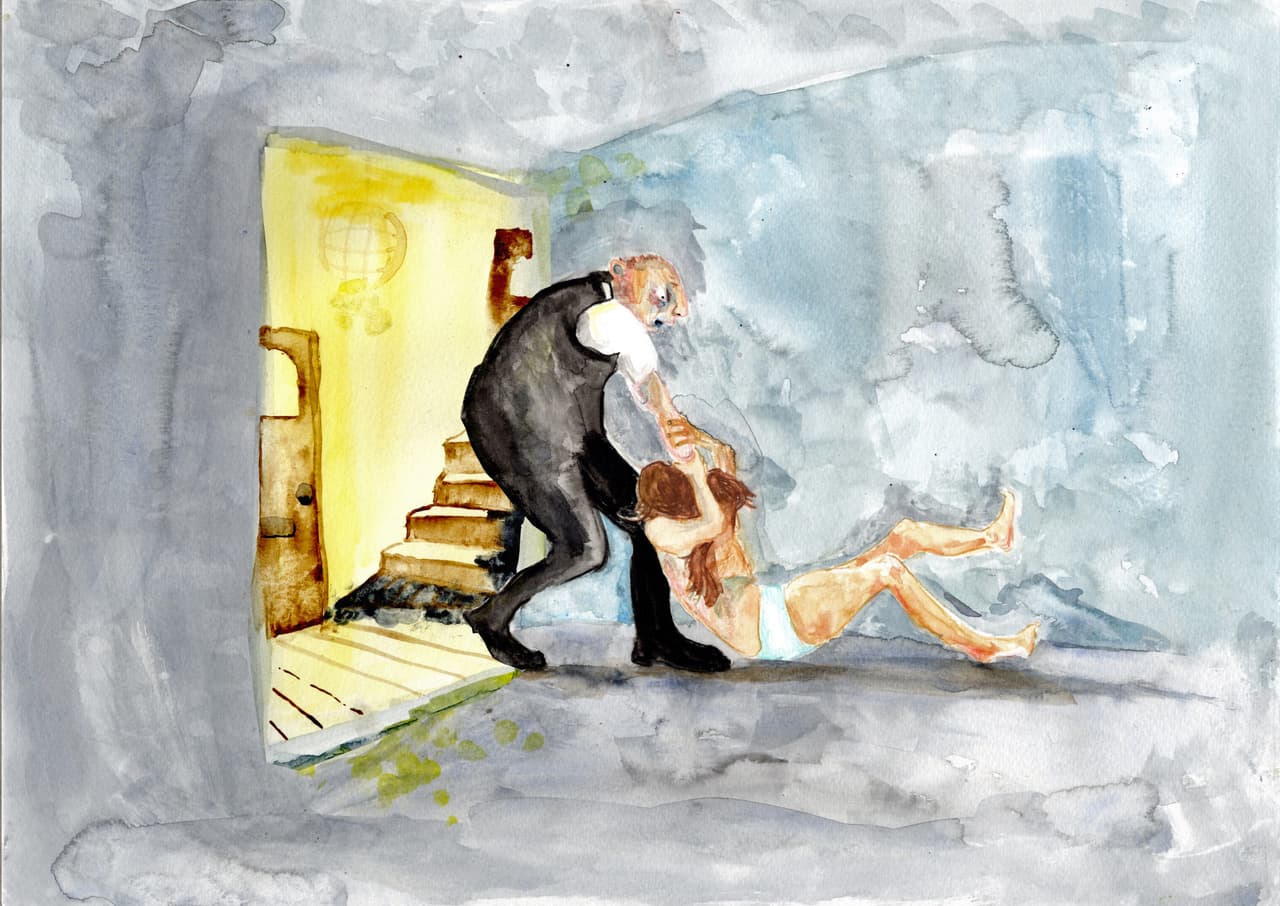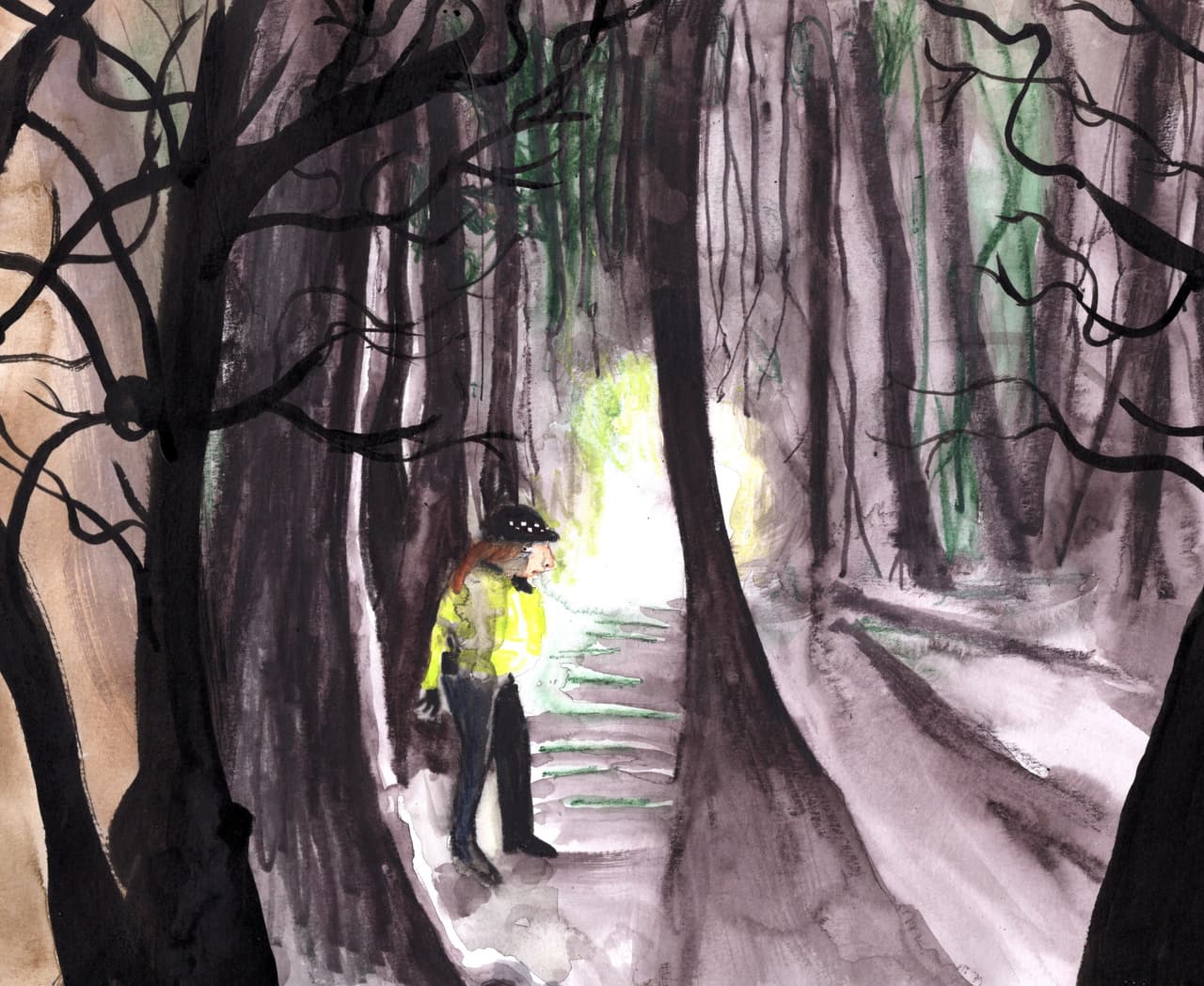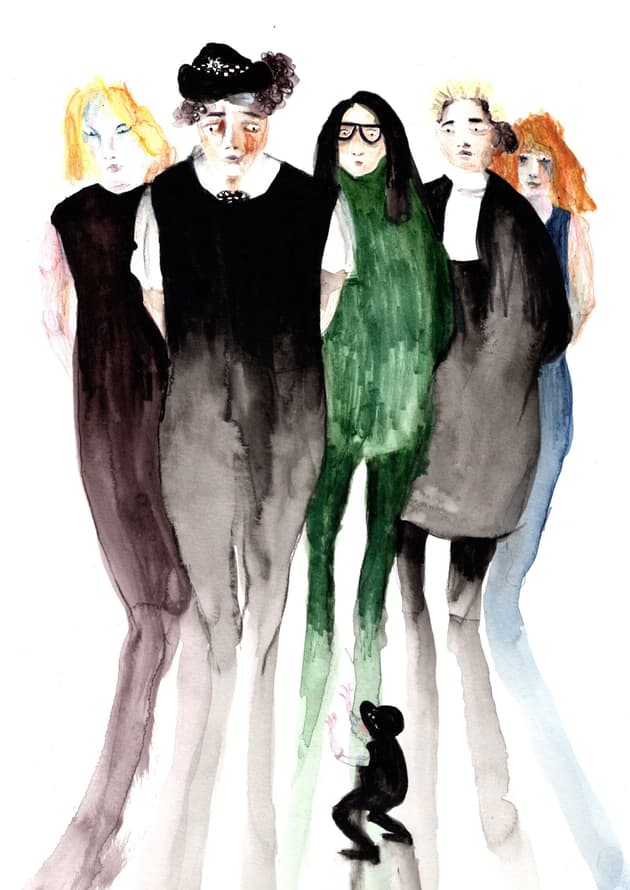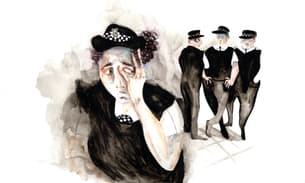
Years of living in fear: police still failing partners of violent officers
“I will probably end up killing your daughter.”
Robert* was a volunteer constable with the Metropolitan police when he sent that message to the mother of his girlfriend, Grace*. Grace would go on to make a complaint to police alleging he had assaulted her many times; internal records show officers noted about 20 incidents over three years, all of which “are of a similar nature consisting of assaults with actual bodily harm level type injuries”. Robert denied any offences had been committed.
Police crime logs and emails obtained by the Bureau show officers at the Met seemingly subsequently took very different approaches to the allegations Grace and Robert made against each other after their relationship had ended. Grace’s report that Robert had been physically assaulting and abusing her was dismissed within four months. She said the police never took a formal statement from her.
However, she was pursued by Met officers for more than two years and threatened with arrest after Robert, by then a full-time trainee detective with the force, told them she had been harassing him via emails and online messages. Twice the case against Grace was closed, only for other officers to open it again.
The Met has admitted that the officers pursuing Grace for alleged harassment were based at Robert’s London police station.
“It felt like I’ve been hunted down by the police,” Grace told the Bureau. To her, it feels “like they’ve spun it so that I’m the perpetrator and he’s the victim.”
She said she had been left feeling utterly traumatised by the way the police treated her. “I now live in fear of the police. Whenever someone rings my doorbell, my intercom or I see police or hear sirens, I panic that they’re coming to get me,” she said. “I feel like I can’t go to them for help with anything.”
No legal or disciplinary findings have been made against Robert.
Grace is the latest of more than 30 people, almost all women, who have contacted the Bureau over the past three years to tell horrific stories of their time living with police officers they say have abused them. Some described being regularly hit, pushed, grabbed by the throat. Others have survived rape or sexual assault, or the distress of watching their children grow up in fear. Several talked of the years of therapy taken to overcome the control and brainwashing.

All of these stories were about alleged bad officers. Officers who, at the very least, failed to live up to society’s expectations of how its police public servants should behave and a number of whom were alleged to have abused the power policing gave them to intimidate and silence their partners.
And many of these allegations were about bad forces. Forces that failed those who found the courage to report their partners’ behaviour to the police. The Bureau reported on force after force botching the investigation and found, in some cases, the police even appeared to become complicit in making the victim feel harassed.
The Bureau revealed through freedom of information requests there had been nearly 700 reports of domestic abuse by police officers in the three years to 2018 – averaging more than four a week. Less than one in ten reports resulted in a dismissal or warning. Only 3.9% of reports resulted in a conviction, compared with 6.2% among the general public. The findings were used by lawyers to launch a nationwide “super-complaint” about the issue, which has led to another 100 women coming forward.
Stay updated on how we uncover evidence needed for change
Follow our investigationsNow the Bureau can reveal that only two forces in the UK – Surrey and Cleveland – have since made changes to their practices. Five more are reviewing their procedures, but gave no further details.
Nev Kemp, the deputy chief constable of Surrey police, told the Bureau he had conducted an audit in response to the super-complaint and was dismayed by the results. “I was quite disappointed with some of the ways we were dealing with some of the cases,” Kemp said. “Not everything was as good as it could or should be.”
He added:“If the public don't think we can deal with it properly with our own, then, goodness knows what they'll be thinking about how we'll deal with it normally. And you know, we say that we take this issue seriously, we need to put our money where our mouth is.
“I would say to other forces, turn the stone over and have a good look … I’d encourage them to do it sooner rather than later because it’s nice to be able to say to the public, ‘Actually, this matters to us, we’ve been proactive about it’.”
Dame Vera Baird QC, the victims’ commissioner for England and Wales, said the Bureau’s findings had shown police are “not protecting women”. The investigation, she said, had “really set the data clearly in place, shown it’s not a small problem”.
“Secondly, it isn’t being tackled,” she said. “We’re getting to a stage where [the Bureau] have sufficiently demonstrated that forces are not going to do anything about it themselves ... It really is time the police leadership started to lay down some rules for how it should be tackled.”
“A rag doll”
Grace met Robert playing on Xbox. She lives with obsessive compulsive disorder (OCD) and found online gaming a good outlet. After talking online for a while they met up. “That went really well. He was the sweetest, nicest guy,” Grace said.
It was after they started living together that Grace said she quickly started seeing red flags. “He tended to have explosive tempers. So he’d act like everything’s okay,” she said, “then out of nowhere, he’d just fly into a rage. And in those moments, it was scary because he’s uncontrollable. He’s like he’s not totally there.”
A few months into their relationship, she was panicking about something that had triggered her OCD. In response, she said “he just went nuts and started going around the flat throwing things everywhere ...He was hitting himself in the head with his iPhone, and trying to pull his hair out. He's doing this in front of me, the six foot man and I'm five foot one. And he's right in my face.” Grace slapped him to snap him out of it. He sat down and when she recovered herself and went to console him, she alleges he then slapped her back and kicked her in the stomach.
Grace alleged that from that point – the only moment she said she was ever violent towards him – he began regularly assaulting her. She said he would often erupt in fury and manhandle her. “He’d push and shove and pull at me ... He would throw things at me.” She would often have bruises on her arms and sometimes legs, she added. To begin, she said, the assaults were monthly, later sometimes two days in a row.
She described the many ways she said he hurt her: once he dug his nails so hard into her hands her fingers bled; another time while throwing her around “like a rag doll” his foot caught her toenail and ripped it off. One night she said, he dragged her, naked except for her knickers, into the communal hallway of their block of flats.
She said he would abuse her mentally as well. At the start of their relationship, her OCD was more manageable. “We were going to the cinema, we went to a Rolling Stones concert,” she said. But then, she felt he he started using her condition to abuse her, regularly trashing their flat and “contaminating” the kitchen with rubbish before leaving. Because her OCD left her unable to use the kitchen or leave the flat until it was clean, she would spend days trapped there, living off packaged food like crisps and biscuits.
“I know it sounds weird, because OCD isn’t the easiest thing to understand,” Grace said. “The way I try to describe it is if someone had a fear of spiders. And imagine if someone abused you and was throwing loads of spiders in the flat and trapping you in there.”

Robert used her condition to justify his behaviour. In an email he sent to her mother he wrote: “I just snapped at [Grace]’s OCD and was unable to contain the frustration that had been building up inside me. I was full of rage which led me to hurt [Grace] and the people around me, both physically and mentally.”
Grace said Robert, then a volunteer special constable, would show her videos of police officers using force on people with mental health conditions to seek to justify how he was treating her.
A few weeks after Robert sent her mother the text message that threatened her life, Grace called the police to ask whether his behaviour was justified. Only wishing to seek an independent opinion, she told them she did not want to support a prosecution or give a statement, nor for Robert to be arrested.
But it was out of her control. The Met did arrest him and he denied the offences. “I knew he’d be angry at me for [him] being arrested,” Grace said. So she covered for him, telling the police on reflection she sympathised with his behaviour, and the case was closed.
The following year, the Met accepted Robert to train as a police detective. The Met told the Bureau that the allegations Grace had made were declared as part of the vetting process, and that he was not charged or convicted.
Kay Neve, a former detective constable at Kent police, said this could have been a missed opportunity to thoroughly examine and weigh up the allegations against Robert during the vetting process. “I was concerned … and I think the general public would be concerned, to find out if an alleged perpetrator of domestic violence has been knowingly employed,” she said. “One alleged incident, perhaps you might think there’s a misunderstanding, but 20 was incredibly concerning.”
She believed there were valid reasons to look at closed allegations during the vetting process, such as issues around trusting an alleged perpetrator to properly investigate similar crimes. She said any applicant in such circumstances should be filtered out for close evaluation at an early stage.
“Circulated as wanted”
After Grace dropped her allegations, her relationship with Robert deteriorated. He had moved back to London without her, and eventually they broke up. She began to see his behaviour not as an unfortunate consequence of her own OCD, but as abuse.
She contacted the police to make her allegations formally, making clear she now wanted to share evidence and support a prosecution. The very next day, Robert complained to the police, accusing her of harassing him via emails and online messages.
The parallel investigations could not have been more different.
Grace’s case against Robert was dropped without explanation. The police never took a statement from her. When she later secured internal police documents via a subject access request, she found her second complaint about Robert appeared to have never even been logged by the Met, and the evidence suggests there was no formal investigation. Records show Grace’s local force told her a Met officer at Robert’s station had closed the case because she had refused to give a statement in support of her first report. The Met told the Bureau the local force had been in charge of the investigation.

“Obviously, with domestic violence, it’s not unusual for females to withdraw allegations,” Kay Neve, a former detective constable for Kent police, said. “Women are fearful, women are frightened to come forward, it takes a lot of courage to actually take a case through to court.”
Grace’s lawyer, Molly Cox of Bhatt Murphy Solicitors, told the Bureau: “It is not clear whether even the most basic steps were taken to investigate Grace’s allegations before deciding to close the case. We are now calling on the police to reopen the investigation.”
Robert did not respond to a request for comment.
Four months after Grace made her formal allegations, she was told no action would be taken against Robert. But she would spend the next two years being pursued over his simultaneous harassment accusation.
Grace said that for a few weeks after they broke up, she was sending Robert several emails a day – at that time, they were living 100 miles apart. She also contacted him repeatedly later in the year when, she said, he had threatened to throw away some of her belongings, including gifts from her late father, and she got in touch with his new girlfriend, she said, to ask if Robert had been cheating on her and warn her of his behaviour.
“I was starting to fully comprehend how much I’d been abused and was finally starting to stick up for myself,” she said.
A Met officer investigating the harassment recorded that while the quantity of messages allegedly sent by Grace “may be of some concern”, they “contain no threat of violence” and “are not alarming”. The officer said the content “would not warrant a custodial sentence” and suggested “the amount of police time and expense required to collect all the evidence … is not proportionate”.
Despite this the Met spent more than two years on the case. The Met confirmed to the Bureau that the alleged harassment was investigated by Robert’s colleagues from his own station.
When Met officers told her the domestic abuse case against Robert was being closed, she responded by telling them and him that she would go to the press. Twenty minutes later, she said, another officer from the same station emailed her a harassment notice. The Met then accused her of subsequently breaching it by contacting Robert. An officer told her to attend an interview, or else be “circulated as wanted, arrested and taken to a police station”. Later it was logged internally as a “mistake”. The case was closed – but not for long.
The following year the Met reopened the case after allegations Grace had contacted Robert’s friends and new girlfriend via multiple Instagram accounts. Again Grace was asked to attend an interview. She told officers she would find it difficult to travel to London because of her OCD and offered to be interviewed by her local police. Records show the Met agreed to this, but found Grace’s local force were “unable” to help.
When, several months later, the interview had not been arranged, a Met officer recorded he had been “left with no choice” but to obtain an arrest warrant. He did so, but then seemingly nothing was done with it, and a different officer dropped the case.
Later, another Met officer opened it for the third time. The crime logs show he gave no reason for doing so, and did not appear to record any fresh allegations against Grace. Yet Met police officers travelled more than 70 miles to try arresting Grace at her home. Grace told the Bureau they had the wrong address.
“It cannot have been necessary for the police to obtain the arrest warrant, given they did not make any attempts to use the warrant until eight months later,” said Cox. “Grace made it clear to officers that she would attend a voluntary interview, and was even chasing them to arrange the interview as she was keen to clear her name.”
The Met is the UK’s largest police force, yet the harassment case was handled by officers at a station where Robert also worked. There is no evidence Robert knew any of the officers involved – and at least one explicitly told Grace he did not know him – but twice officers pursuing Grace for harassment were taken off the case because they were now working with Robert.
The Met said that the harassment investigation “was subject to a complaint under which the roles of officers was examined” which “found no case to answer”. “Measures are in place to deal with cases involving police personnel in order to safeguard the integrity and effectiveness of the investigation.”
Grace said having the allegations hanging over her severely impacted her mental health. “How I was treated by the police has left me utterly traumatised,” she said. She was hospitalised after an overdose in 2018. “I can’t explain the stress it’s caused my life and the effect it has had on my OCD.”
Finally, in 2019, a voluntary interview took place with Grace’s local police. The Met received the transcript two days later, but Grace said she had to wait another seven months for the force to tell her in 2020, for the final time, the case against her was being closed with no further action.
That same year Robert, having finished his training, was working as a detective.
“There is a striking disparity between the treatment of Grace’s and Robert’s allegations by the police,” said Cox. “Grace reported serious and sustained domestic abuse, yet her crime report was closed after four months apparently without any investigation. In contrast, Robert reported messages which the police themselves considered ‘low level, and yet the police investigated Grace doggedly for more than two years.”
No legal or disciplinary findings of wrongdoing have been made against Robert.
The Met told the Bureau: “Any allegation, disclosure or conviction of domestic abuse perpetrated by an officer or member of staff is robustly investigated.” The force said it will be updating its domestic abuse employee policy to reflect changes to domestic abuse law this year.
Grace is planning to take legal action against the police.
Lack of action
Grace’s story is one of several the Bureau has reported on, each highlighting different concerning facets of what can happen when someone reports having been abused at home by a member of the police.
Many of the women who contacted the Bureau alleged their abusive partners would misuse their professional roles against them, from telling them the police were a “tight-knit family” and no one would believe them, to recording them at home for “use in court” to stalking them in marked police cars. One woman said her husband used his police training about victim psychology to manipulate her.
Among those who reported the abuse, many spoke of failures in the criminal investigation. One said police took her evidence to the station where her husband worked and some of it disappeared. Her statement also went missing. When she was talked down from a suicide attempt, she said, his colleagues took her back to him against her will, despite her telling them about the abuse allegations. Another force lost the record of a woman’s report of rape and did nothing after her young child told officers his father had tried to strangle and suffocate him. One woman said she was told by officers that she should “think very carefully” before reporting one of their colleagues.
It was a similar picture for internal misconduct procedures. Greater Manchester police found that an officer had given factually incorrect and incomplete information to police and a court to try to have his ex-partner arrested, but the force said because he had done this in his private life it was not misconduct. Merseyside police failed to discipline an officer who breached bail after his partner accused him of physical and verbal abuse. Another force never even suspended an officer accused of rape by two female colleages he had dated and he had carried on working alongside other female officers for three years.
Sometimes, as with Grace, police forces appeared to take disproportionate steps against the woman when her officer partner would accuse her of wrongdoing. In the Greater Manchester case, police arrested the woman multiple times on her ex’s allegations of harassment via text and email.
For some women who worked for the police alongside their abusers, neither work nor home were safe. One said colleagues left her in a forest in the middle of the night on duty to “teach her a lesson” after she reported her officer ex-partner. Another claimed that her boss, who knew her partner, repeatedly pulled her up on her performance after she reported him. She said the officer investigating the domestic abuse allegations knew her partner personally.

Given the possibilities for conflicts of interest, it might be expected that forces would have measures in place for dealing with allegations of domestic abuse by their own officers. But in 2018 less than a third of forces told the Bureau they had any specific system.
When the Bureau recently asked all 48 forces across the UK if they had updated their practices since the first story in this investigation was published in 2019, just two of twenty respondents had. The new procedures in Cleveland and Surrey include that a senior leader should be appointed to oversee any such case and the suspect should be taken to a station they do not usually work at. Surrey’s policy adds that police records about the case should be restricted and the investigating officers must not know the perpetrator personally.
Surrey’s deputy chief constable Nev Kemp said the last measure was particularly important. In one of the cases he had audited, the investigating officer was linked to the suspect on social media. “If you’re a victim [you’re] already thinking, ‘Well, he’ – and it is generally a he – ‘is part of the police, they’re not really going to believe me’,” he said.
The level of senior oversight the force has now brought to these cases is comparable to that for very serious crimes, such as murders, he added, and the suspect must now always be referred to professional standards. He said his force would ask for feedback from the victim in every case.
Baird, the Victims’ Commissioner, was disappointed that Surrey and Cleveland’s new practices did not involve a different force conducting the investigation. “It’s probably intended well but I doubt that it’s going to cut through the camaraderie,” she said. During her time as Northumbria police and crime commissioner, she found most officers at smaller forces knew each other and she added that policing generally encourages a culture of loyalty. “It is hard to separate that off and take seriously a complaint [of domestic abuse] from a complete stranger … against somebody who you either have worked with or know somebody who has,” she said.
Kemp said he had considered appointing an external force but chose to keep it in house to avoid delays and monitor performance. “If we were to get feedback from victims that they in any way felt uncomfortable or that there was a lack of transparency with it being investigated within our own force, we would ask another force to do it or I would reconsider the policy,” he said.
Calls for an external force to investigate were made by lawyers at the Centre for Women’s Justice when they lodged their “super-complaint” about domestic abuse within the police with regulators in March 2020, based on the Bureau’s findings. “There will always be abusers amongst any group of men and a natural tendency for forces to want to protect their own officers,” said Nogah Ofer, who prepared the super-complaint. “Unlike other issues such as officers abusing their position for sexual gain, the police oversight bodies had not given attention to or seriously grappled with the issue before, as far as we were aware.”
The College of Policing is investigating the super-complaint and said it would be inappropriate to comment while the process is ongoing.
The unanswered questions
Over the past year, successive lockdowns across the world trapped abuse victims at home. The murder of George Floyd and subsequent global protests illuminated not only systemic racism, but also a wider culture of violence internationally among police officers. And in the UK, the arrest of a Metropolitan police officer later charged with murdering Sarah Everard, and the police’s handling of a vigil in her memory, prompted scrutiny of violence against women by police officers.
But domestic abuse within the police has gone relatively unexamined in the UK compared with elsewhere.
Why some officers abuse their partners and families has been a topic of study in the US. Researchers have previously suggested exposure to both violence and authoritarianism at work is one of the factors.
“With many police officers, it’s very difficult to turn it off when they go home, they’re really sort of consumed by their jobs and they’re used to giving directions, barking out commands, and people doing what they’re told to do,” said Professor Philip Stinson of Bowling Green State University in Ohio, who has been collecting news reports on police officer arrests – including for domestic violence – across the United States since the mid-2000s.
He added there may also be a link, as suggested by some researchers, between officer post-traumatic stress disorder and violence at home, and said people with already authoritarian personalities could be drawn to policing.
Even in the US research on this issue is scant, and the Bureau has not been able to find any academic work about domestic abuse by police officers in the UK.
Stinson said finding these answers – and learning whether the system produces perpetrators, draws them in or simply tolerates them – was vital to improving policing.
“There’s a lot of discussion in the public discourse about what do we want to do to reimagine policing ... What functions are they going to do and are we going to move off on to other social service agencies?” he said.
“What type of people do we want to be police officers?”
*Names have been changed.

Reporters: Alexandra Heal and Sarah Haque
Investigations editor: Meirion Jones
Production editor: Frankie Goodway
Fact checker: Chrissie Giles
Legal team: Stephen Shotnes (Simons Muirhead Burton)
Illustrations: Danny Noble
This report was supported by core Bureau funds. None of our funders have any influence over the Bureau’s editorial decisions or output.
Header illustration: A police officer drags a women wearing only her knickers out of a flat's front door
-
Area:
-
Subject:





